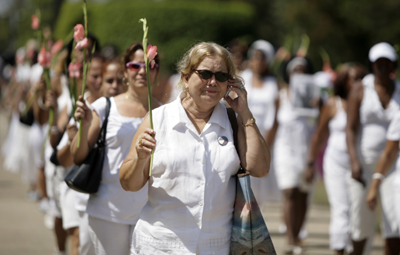Cuban human rights defender Laura Pollán, who died Friday from respiratory complications at a Havana hospital, fought a mighty battle against the Cuban government for almost a decade. Pollán, 63, leaves behind her husband, the award-winning independent journalist Héctor Maseda Gutiérrez, and a daughter. She also leaves a legacy of determination, courage, and creativity. Her powerful belief in justice was ultimately rewarded when dozens of wrongly imprisoned dissidents and journalists, including her husband, were freed from prison over the last two years, in large part due to her efforts.
Pollán was a Spanish teacher who hadn’t taught for years because the Cuban government had blackballed her due to her human rights activities. Back in 2003, she had started a protest group with a number of other Cuban women whose husbands, sons, and brothers had been arrested during the government’s Black Spring crackdown on the independent press and dissent. The group was formed to extract information from Cuban authorities about the imprisonments of 75 journalists and dissidents on antistate charges. (Maseda Gutiérrez, arrested during the second day of the crackdown, was sentenced to 20 years in prison in 2003.)
But with so many independent journalists and dissidents in prison, Pollán’s group quickly became a force of its own. Inspired by Argentina’s Madres de la Plaza de Mayo, who called attention to relatives who disappeared during the country’s military regime, Pollán’s Damas de Blanco (Ladies in White) held weekly public demonstrations to demand the Cuban government release the political prisoners. Every Sunday, the Ladies marched from the Church of Santa Rita down Havana’s Fifth Avenue, dressed in white head to toe, holding pink gladiolas in their hands. Often, they were harassed by onlookers. At times, they were roughed up and detained. But they never relented.
Early on, Pollán became the group’s de facto spokeswoman, and her tiny Old Havana home the Ladies’ headquarters. Each Wednesday afternoon, the Ladies would meet for what they called a literary gathering. Not all members could attend every meeting. Cuban authorities or government proxies often blocked members from leaving their homes or entering Pollán’s neighborhood. But the meetings always went forward. The Ladies who gathered in Pollán’s living room discussed their loved one’s health and legal situations, and they debated the group’s next political moves. Often, they had to shout over the amplified music that government supporters blasted outside as a form of harassment.
Pollán’s home was an impromptu hostel where out-of-town Ladies stayed while they visited loved ones jailed in Havana, filed legal papers, or attended the Wednesday gatherings. The house was also an information center for international reporters and human rights organizations, including the Committee to Protect Journalists. When news broke in Cuba, Pollán’s number was always at the top of the contact list. In a hoarse voice and thick Caribbean accent, Pollán would give the latest details about an arrest, a protest, or an inmate’s ailment. If she didn’t have the answer, Pollán was always eager to find it–even if the frequent clicks on her line made it clear that her phone was tapped.
During the time her husband and more than two dozen other journalists were in prison, Pollán worked with CPJ to get small grants to the families of those journalists who most needed it. Every month, she helped us identify journalists with serious health conditions or families struggling to find the necessary funds to travel to a far prison. Every year, she helped CPJ compile details of prison conditions and new arrests that helped us maintain a clear picture of repression against the island’s press. Pollán’s work with CPJ’s Journalist Assistance program made the Cuba project one of our most effective.
Pollán was moved when we called to say that her husband, still jailed at the time, was a recipient of a CPJ 2008 International Press Freedom Award. In a brief note to CPJ, she said she felt proud of being his wife. Pollán said that she believed the award was not only for Maseda Gutiérrez but for all Cuban journalists “who risk their lives to inform what’s going on in Cuba and outside prison walls.”
In February of this year, after seven years behind bars, Maseda Gutiérrez was released from jail and was able to return home to his beloved wife. He was among the last of the 29 journalists originally jailed in the Black Spring to be freed. Shortly after his return, Pollán wrote for the CPJ Blog about her experiences.
“Sometimes they tell us, the Ladies in White, that we are brave women,” she wrote. “We disagree: We’ve simply experienced so much pain and love that, without realizing it, we crossed that line between fear and bravery.”
